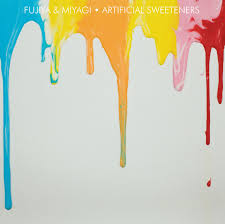There’s always been a dichotomy bound up with the music of Fujiya & Miyagi. Their last release, 2011’s Ventriloquizzing, found the Brighton purveyors of beat-driven kosmische dance grooves exploring themes of darkness and shadowy activity whilst presenting them with a sheen so gloriously buffed up that sunglasses were a necessity in its presence. Hardly surprising given that the album was recorded in California – a state with more than its share of questionable activity bubbling beneath its sunny veneer.
With their fifth album, Artificial Sweeteners, Fujiya & Miyagi once again mine opposite ends of the lyrical spectrum whilst delivering their most musically satisfying collection to date. For sure, the krautrock influences remain firmly in place but here they’ve added a greater a sense of sonic joy that’s clearly aimed at the dancefloor. Going back to a three-piece, Fujiya & Miyagi have upped the levels of vintage analogue synths, bouncing bass lines and insistent rhythms whilst maintaining David Best’s trademark near-whispered vocals that manage to sound simultaneously menacing and soothing. If your dentist were to make music then it would probably sound a lot like this.
Opener ‘Flaws’ sets out the stall early. A huge, pumping monster of a track, this is a terrific call to arms that at once demands your attention and happy feet whilst heralding new horizons for Fujiya & Miyagi. Driven along by one of their most nagging riffs which soon takes up residence in the brain on a long-term let, it’s followed up by the kind of perverted funk that they’re rapidly making entirely their own in the shape of ‘Acid To My Alkaline’.
But while these tracks usher in a new feel for the band, the title track betrays their influences of the pioneering music that emanated from Germany in the 70s. This is no bad thing as the trivialities of consumerist culture are fed through the filter marked ‘Harmonia’ that straddles both anger and abandon. Crucially, Fujiya & Miyagi don’t rely on their favorites for long. As displayed by the two instrumental cuts contained here – ‘Tetrahydrofolic Acid’ and ‘Rayleigh Scattering’ – the band finds itself beneath the shooting shards of the mirror ball lights. The former, as suggested by its name, is an utterly seductive acid house groover while the latter is infused with a cinematic and European quality.
That closer ‘A Sea Ringed With Tears’ fails to pass muster thanks to a lack of direction hardly matters. What precedes it is an album that grows in stature and affection with each subsequent listen. But the real dichotomy that surrounds Fujiya & Miyagi is still an unexplained mystery: how does a band this good continue to remain a cult concern?


